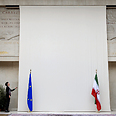
Israeli official: US wants to sign Iran deal to avoid strike
Sources in Jerusalem confirm that nuclear deal with Iran is, as Netanyahu noted, bad deal, which the US will only sign 'because they fear the only alternative left – sans deal – is a strike.' Reports reveal that Israel is not only nation to oppose deal
A senior Israeli official addressed on Sunday the nuclear talks between Iran and the West, saying "The Americans are anxious to sign a bad deal because they fear the only alternative left – sans deal – is a strike."
"The deal really is bad," the official added. "There's no doubt that if they sign now, Iran will turn into a threshold state and there won't be any deal that could stop Iran from developing its nuclear plan."
Related stories:
- Kerry: US 'not blind, stupid' in nuclear talks with Iran
- Geneva talks with Iran conclude without deal
- Rohani says nuclear rights are 'red lines'
World powers are to meet Iranians on November 20, to renew the talks. "We've realized they need more time," a senior US official said. We understand Prime Minister Netanyahu, who takes care of Israel's defense interests."
Following reported progression in nuclear deal with Iran, Prime Minister Benjamin Netanyahu has stressed that Israel was not the only country that was against the impending deal.
"There are many, many Arab leaders in the region who are saying this is a very bad deal for the region and the world," Netanyahu said. "You know, when you have the Arabs and Israelis speaking in one voice, it doesn't happen very often; I think it's worth paying attention to us."
According to reports, nuclear negotiators have indeed been facing resistance from both Israel and Gulf states toward any pact that keeps Iran's nuclear program generally intact.
It is unlikely that critics could derail international efforts to ease one of the Middle East's most far-reaching standoffs, which has brought Israeli threats of military action, past warnings by Iran it could block critical oil tanker shipping lanes in retaliation for sanctions and opened rare public discord between the US and Saudi Arabia.
Netanyahu said Friday that he "utterly rejects" any emerging nuclear deal between Western powers and Iran, and pledged that Israel would do what was needed to defend itself – a clear reference to past warnings of military action to degrade Iran's nuclear capabilities.
Gulf states
Saudi Arabia and the other Gulf states consider Iran as their chief rival in the region and – in a rare alignment of views – side closely with Israel's outlook that Iran should be stripped of its ability to enrich uranium.
For years, Saudi Arabia's King Abdullah repeatedly urged the United States to "cut off the head of the snake" by attacking Iran's nuclear facilities. Now, Saudi officials are dismayed over Washington's efforts to end the 34-year diplomatic estrangement with Tehran.
Gulf states are major buyers of advanced US military equipment, but Saudi Arabia has hinted it could one day build closer strategic ties with nuclear-armed Pakistan as a way to guarantee its own de facto nuclear weapon status to counterbalance Iran. Washington, which has often said it fears an atomic arms race in the Gulf, would certainly oppose such an alliance.
But Saudi relations with the US have reached a difficult juncture. Saudi officials have openly criticized US President Barack Obama for his outreach to the new Iranian president. Last month, Saudi Arabia rejected a seat on the UN Security Council to reinforce its protest the US-Iranian diplomatic exchanges and the US decision to pull back from possible military strikes against Syrian President Bashar Assad's forces and instead back a Russian-drafted plan to collect and destroy Assad's chemical weapons supply. Saudi Arabia and other Gulf states are key backers of rebels seeking to topple Assad.
Iranian hard-liners
Opposition to nuclear agreements can also be seen from within the Islamic republic. Last month, banners began appearing around Tehran that depicted the US as a manipulative and bullying negotiating partner seeking to undermine Iran any way it can. No group claimed ownership of the messages, but that was unnecessary in a country where it's already clear the forces that are lining up against any deals that could somehow close the diplomatic chasm with Washington.Hard-liners led by the powerful Revolutionary Guard and its vast network of backers have strongly opposed the stirrings of rapprochement started by Iranian President Hassan Rohani. Last Monday, they organized the largest anti-American demonstration in years to mark the anniversary of the 1979 takeover the US Embassy after the Islamic Revolution.
The dissent, though, has its limits.
Rouani's critics are not likely to stand in the way of a possible nuclear deal with the West since the negotiations have the support of Iran's Supreme Leader Ayatollah Ali Khamenei. Also, the public largely supports bids to ease sanctions and even hard-liners do not want to be on the wrong side of that issue.
Syrian oposition
Rebels fighting to topple Assad remain divided on whether a nuclear deal would benefit or hurt their cause.
For many, an easing of Western pressure on Iran means Tehran would have a freer hand in the region. Nizar al-Hrakey, a member of the Syrian National Coalition and the group's representative in Qatar, compared it to the Russian-US deal to try to rid Syria of its chemical weapons stockpile rather than carry out military strikes.
However, Kamal Labwani, a veteran Syrian opposition figure, said Iranian concessions to the West mean "total surrender," adding he hoped it would lead to a more sidelined role for Iran in Syria.
Roi Kais, AP contributed to this report
- Receive Ynetnews updates directly to your desktop










